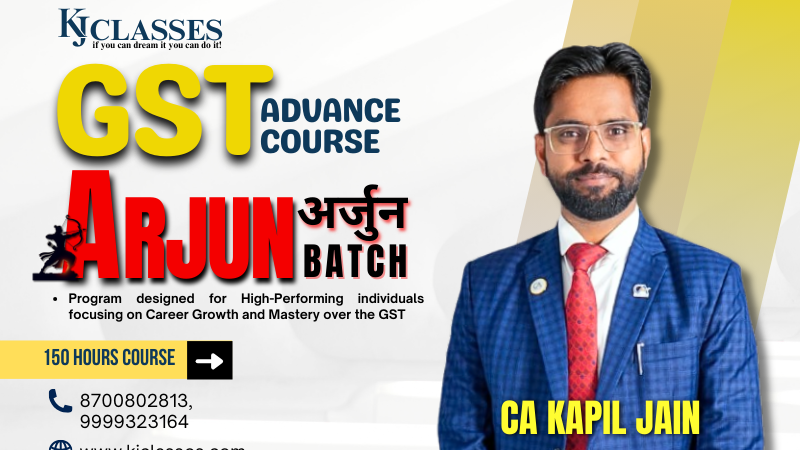About Course

GST Advance Course – Arjun Batch: The Comprehensive Guide
The Arjun Batch GST Advance Course is designed for professionals seeking to master GST regulations in India. With complex regulations and frequent updates, a deep understanding of GST helps businesses ensure compliance and optimize tax benefits. The course covers essential aspects, from registration to refund processes, making it ideal for beginners and experienced professionals alike.
Importance of Learning GST Advance Course with the Arjun Batch
The Arjun Batch equips learners with a practical understanding of GST laws, preparing them to handle real-world scenarios. The course dives into essential sections, rules, and forms in a structured approach, helping learners tackle GST compliance confidently.
Overview of Key Topics Covered in the GST Advance Course Arjun Batch
■Basic of GST (Section 1, 2, 9(3), (4), (5), 10))
■ GST Registration (Section 22-30, Rules 08-26, Forms 1-30)
■ Returns Under GST – Section (37-48) Rules (59-84)& Forms GSTR-1,GSTR-3B, QRMP Scheme, IFF (Invoice Furnishing Facility)
■ Input Tax Credit – Section (16-21)with GST Rules
■ Input Tax Credit – Section (16-21) with GST Rules
■ Availment of input tax credit (Section 41)
■ Tax Invoice, Accounts & Records (Section 31-36) With GST Rules
■ Payment of Tax and Interest (Section 49-50) With GST Rules
■ Supply, Time of Supply, Value of Supply
■ Refunds (Section 54-58) with GST Rules
■ TDS & Electronic Commerce in GST (Section 51&52)
■ Audit {Section 65, 66)
■ E-way Bill {Section 68,129,130 read with rules)
■ Assessment {Section 59-64)
■ Summon Issued by GST Department & How to Handle Summon {Section 70)
■ Demand and Recovery {Section 73-76 & 79 & 79)
■ Advance Ruling (Section 95-97)
■ How to Reply Notice & How to file Appeal
Conclusion
The GST Advance Course – Arjun Batch is a comprehensive program that covers every aspect of GST law, from registration to advanced ruling. Whether you are new to GST or looking to deepen your understanding, this course is designed to provide the skills and knowledge needed for effective GST management and compliance.
FAQs
- What is the GST Advance Course – Arjun Batch?
It’s a specialized course covering all essential aspects of GST law, ideal for practitioners and professionals.
- Who should enroll in this course?
This course is designed for anyone involved in GST compliance, including accountants, business owners, and tax consultants.
- What are the main topics covered in the course?
Topics include GST registration, returns, input tax credit, assessments, e-way bills, and much more.
- How can this course benefit my career?
By gaining expertise in GST, you can enhance your professional skills and open up new career opportunities.
- How long does it take to complete the course?
The course duration varies depending on individual pace, but it’s structured for comprehensive understanding within a few weeks.
Join our Telegram Channel For More updates:- KjClasses Updates


